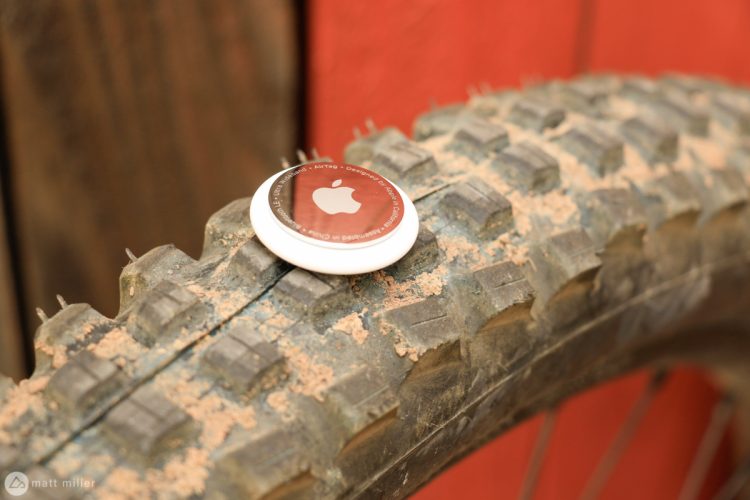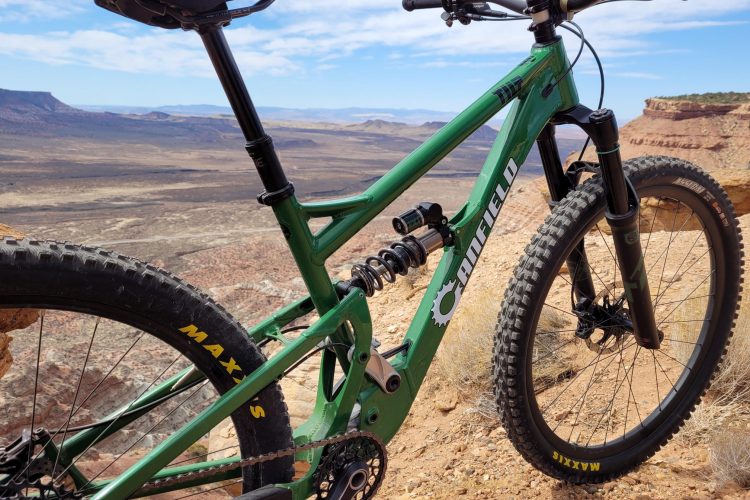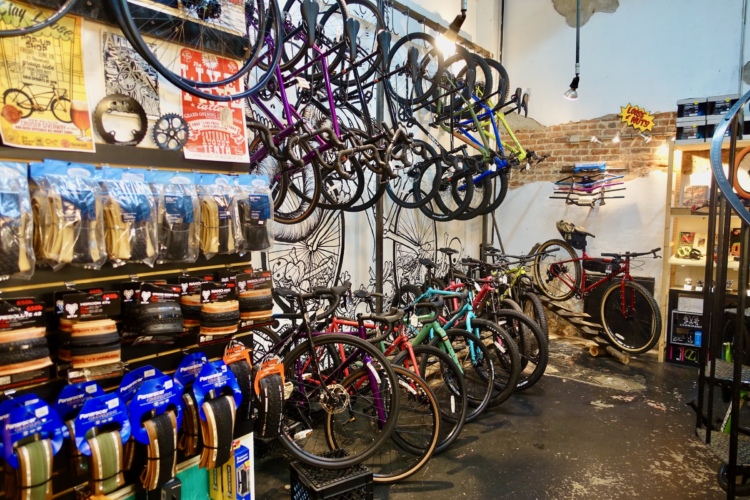It’s easy to find stolen bikes. Tap open OfferUp or Facebook Marketplace near a major city, and likely you’ll find a feed full of bikes being sold by people who didn’t buy them, says Bryan Hance, cofounder of Bike Index, a national database where people can register their bikes and enhance the possibility for recovery. The site also tracks data on stolen bikes nationwide.
Hance tells bike theft victims OfferUp and Facebook are the first places they should look. Thieves who are looking to make a quick buck will often post several thousand dollar mountain bikes for just a few hundred dollars.
A different sect of criminals however is finding that stealing high end mountain bikes can be a lucrative endeavor. In December, Bike Index published an investigation where they tracked over a thousand stolen bikes ads from hundreds of bikes that had made their way from all over Colorado to one seller in Juarez, Mexico. Their investigation was timely. The Colorado Attorney General’s office indicted eight suspects who have allegedly stolen almost $1,000,000 in mountain bikes, though there isn’t a definite connection yet between the two separate investigations.
In early 2021, Bike Index registrants started tipping off Hance about a seller in Mexico that appeared to be selling stolen mountain bikes. The page was locked by region so it was only visible to users with a Mexico IP address. Hance used a VPN to route through a different IP address and took a look. He noticed a few bikes off the bat that were also registered to Bike Index and oddly, they all had stickers from their original Colorado bike shops.
“I was like, yeah it’s pretty weird to have three of these things in Juarez, all with Colorado shit on them,” said Hance in an interview. “That’s a pretty big indicator.”
Hance grabbed a bunch of images of the posted bikes and initially identified ten stolen bikes. He told the victims to let their police department contacts in Colorado know that their bikes had been located in Mexico, and he started monitoring the shop and their postings every day.
Alexander’s Bikes in Juarez looked legit. The bikes were washed, tires shiny, posed against a stone wall with a big custom logo. The Facebook page listed hours of operation and positive reviews.
But details designed to add legitimacy, like custom shop stickers, were sloppily placed over the original bike shop stickers. Other stickers, like Colorado cycling clubs and easy identifiers were never removed. Victims spotted their unique cockpit setup, or one anodized spoke from a custom wheel build, and specific dents or marks on the bikes. All of the bikes were posted without pedals, indicating they might have been placed in a shipping configuration in a big container or box truck.
Later on, the criminals unknowingly posted some pics of Guerrilla Gravity bikes with the serial numbers below the head tube logo in clear resolution.
After seeing the first few stolen bikes, Hance made it a point to check the Facebook page every day, record the postings and details and save the photos. He’d relay the information to Bike Index registrants and remove the Alexander’s Bikes logos in Photoshop so victims wouldn’t tip off the seller. That had happened before in other cases, and as a result the seller would usually vanish.
Over the course of Bike Index monitoring the posts and communicating with victims, they noticed the bikes were taken with a variety of methods. Some were from home or vehicle break-ins, some stolen from public locations, some in commercial burglaries. The odd thing was that so many of them ended up at this one seller. Bike Index captured 1,077 bike sales posted to Alexander’s between February and December when they published the report. Some of the ads were repeat posts, but hundreds of the bikes were believed to be stolen and matched to victims in Colorado.
Sayonara, Alexander


Three things happened after publishing their findings on December 16, said Hance. First, more bike theft victims came forward and connected with Bike Index.
Some of the victims included other bike shops in Mexico that had also been burglarized and believed that their bikes might have been sold through Alexander’s Bikes.
Hordes of online Mexican cycling groups caught wind of the story and started attacking Alexander’s Bikes. They posted to the page, stating that Alexander’s sold stolen bikes. The people behind Alexander’s tried to contain the damage, deleting those posts and soliciting and upvoting positive reviews. But, after a few days, they couldn’t keep up and deleted the page entirely.
Before deleting the page though, Alexander’s Bikes posted a letter that admitted to selling stolen bikes and that they were aware of the Colorado-based investigation and prosecution and would fully cooperate with the authorities. Alexander’s Bikes called themselves a victim of organized crime and denied that they were affiliated with the eight indicted suspects from Operation Vicious Cycle.
Hance isn’t sure what will come from Alexander’s Bikes now. “We suspect that he either will A: rebrand and pop back up later, or he just sold all his inventory to another dude that’s just like him.”
Through capturing the data, Bike Index looked thoroughly at the resale value of stolen bikes and found that they were being sold for most of their value in the States.
“It’s only just below what an American reseller would sell these things for,” said Hance, and at ten bikes a week, for around $4,000 each, Alexander’s was making good money in the stolen bike business, though Bike Index isn’t aware of the overhead costs they kept, such as acquiring the bikes or packing and shipping them. Some of the bikes appeared to make their way into Alexander’s within two weeks of them being reported stolen in Colorado.
Hance hopes that he’ll learn more about the costs of the operation and how much money the enterprise made when Operation Vicious Cycle plays out in court. The suspects appear to be due for their arraignments and initial court dates in the coming weeks and months.
We reached out to Alexander’s Bikes via email but did not hear back.
Operation Vicious Cycle
In November, a month before Bike Index published its article, we reported on the indictment of eight individuals who are suspected of stealing close to $1,000,000 in bikes from bike shops in Colorado. Bike Index noted that they believe some of the bikes they have archived from the Alexander’s Bikes posts were stolen from the burglarized shops.
The Colorado Attorney General’s office hasn’t explicitly said that the stolen bikes went to Mexico, but that they were given to a “fence” — or someone that sells stolen goods — and the bikes were moved “out of state and possibly to Mexico in a box truck that he [the fence] owns in order to sell them,” according to one of the indictments.
The investigation notes that a box truck owned by one of the indicted individuals crossed the border 158 times between August 2019 and August 2020. Though the indictment does not say where the fence crossed the border, it’s stated that he made large cash deposits in El Paso, Texas, which coincidentally is directly across the border from Juarez, Mexico. The indictment says that the suspected fence claimed to buy and sell products at flea markets in El Paso.
A representative from the Colorado Attorney General’s office could not offer further information because of the ongoing prosecution.
The problem with stolen goods on social media
There’s no good way to report stolen goods on either OfferUp or Facebook, said Hance. He’s tried flagging sellers, but there aren’t links for reporting stolen goods on Facebook. Reporting the page for “unauthorized sales” has essentially done nothing for them, and there isn’t a way to add information in the report. OfferUp does have a section to add notes when reporting stolen property.
The majority of the emails Hance receives from bike theft victims involves OfferUp in some way — either a stolen bike has been found on OfferUp or someone has multiple stolen bikes listed via OfferUp again and again.
Facebook says to do two things: report the listing to Facebook and to local law enforcement, though the law enforcement individuals Hance has worked with have told him it’s equally as frustrating for police to do anything.
“The amount of time it takes to submit a report, get a cop on the phone, find one who’s not buried — by then the bike is long gone,” said Hance. “The whole system is built in the thief’s favor. And you can use OfferUp and Facebook interchangeably here.”
We reached out to Facebook for information on selling via Marketplace, and a representative said that they recommend users report the listing and contact law enforcement. Facebook says that they use a commerce review system to check reports of stolen goods, though their reviews are “largely automated.” The systems are built by teams of employees and in some cases Facebook manually reviews listings.
Changing the perspective on stolen bikes
Bike Index’s article went viral after it was published. Other news outlets have picked up the story and the timely relevance to Operation Vicious Cycle seems to have shifted the perspective on stolen bikes, even if it’s just a little. Sure, there are the indigent criminals wrapped up in substance use issues who steal bikes in an opportunistic fashion. Now it’s clear that there is a massive counterpart with a sophisticated level of operation capable of making million(s) of dollars selling stolen bikes.
Bikes aren’t just “a stupid play thing that, you know, rich ass white guys in lycra do,” said Hance. “No, this is a tool for criminals to make a shitload of money.”
6/14/24: Wired recently published an extensive story about the stolen bike ring here.
























3 Comments
Jan 5, 2022
Jan 5, 2022
Jan 6, 2022